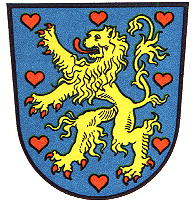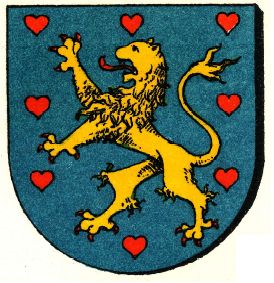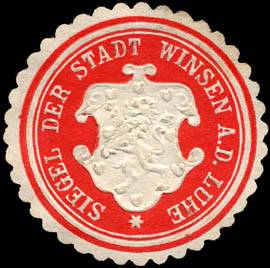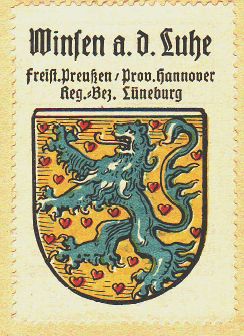Winsen (Luhe): Difference between revisions
Knorrepoes (talk | contribs) m (Text replacement - "{{de}}" to "") |
Knorrepoes (talk | contribs) m (Text replacement - "{| class="wikitable"↵|+Official blazon↵|-↵|'''German'''↵| ↵|-↵|'''English''' ↵| {{blazon wanted}}↵|}" to "{| class="wikitable" |+Official blazon |- |'''German''' | blazon wanted |- |'''English''' | blazon wanted |}") |
||
| Line 13: | Line 13: | ||
|- | |- | ||
|'''German''' | |'''German''' | ||
| | | blazon wanted | ||
|- | |- | ||
|'''English''' | |'''English''' | ||
| | | blazon wanted | ||
|} | |} | ||
Revision as of 08:11, 6 April 2023
WINSEN (LUHE)
State : Niedersachsen
District (Kreis) : Harburg
Additions : 1972 Bahlburg, Borstel, Gehrden, Hoopte, Laßrönne, Luhdorf, Pattensen, Rottorf, Roydorf, Sangenstedt, Scharmbeck, Stöckte, Tönnhausen
| German | blazon wanted |
| English | blazon wanted |
Origin/meaning
The arms show the arms of the Dukes of Braunschweig-Lüneburg, who granted the city rights to Winsen around 1292. The oldest seal dates from the same time and is known since 1318. In a second seal, dating from the 14th century, the hearts were replaced by small crosses to distinguish the arms of the city from those from the dukes. In the 19th century, however, the hearts were officially restored and have been used since. The city, however, has used the hearts on paper and on buildings for many centuries. But the seal showed the crosses.
| The arms as shown in 1891 |
Seal from around 1900 |
| The arms in the Wappen-Sammlung (1900) |
The arms by Hupp in the Kaffee Hag albums +/- 1925 |
Literature: Stadler,1964-1971, 8 volumes; Ahrens, 1891




